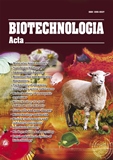ISSN 2410-7751 (Print)
ISSN 2410-776X (Online)

Biotechnologia Acta Т. 17, No. 2 , 2024
P. 29-32, Bibliography 6, Engl.
UDC:576.3(075.8)
DOI: https://doi.org/10.15407/biotech17.02.029
THE EFFECT OF CAFETERIA DIET AND SOCIAL ISOLATION ON SOME BIOCHEMICAL, PHYSIOLOGIGAL AND BEHAVIOR PARAMETERS IN MICE
V.P. Derkachov, М.М. Bayliak
Department of Biochemistry and Biotechnology of the Vasyl Stefanyk Precarpathian National University, Ivano-Frankivsk, Ukraine
Recent studies have shown that social isolation can impact weight regulation and eating patterns in mice. Isolated mice tend to consume more food, especially high-calorie palatable foods, engage in less physical activity, and exhibit dysregulation in appetite hormones like leptin and ghrelin.
Aim. The purpose of this study was to test the effects of cafeteria diet and social isolation on physiological and biochemical indicators in mice.
Methods. Female C57BL/6J mice were divided into four groups: group-housed on regular diet, group-housed on cafeteria diet (high-fat, sugary foods), socially isolated on regular diet, and socially isolated on cafeteria diet. Body mass, food/water intake were measured over 12 weeks. Blood glucose, behavior in an open field test, protein levels, paraoxonase and myeloperoxidase activity were measured in the end of experiment.
Results showed that cafeteria diet and social isolation each led to increased body mass, food intake, and blood glucose levels compared to group-housed mice on regular diet. Socially isolated mice on cafeteria diet exhibited the greatest weight gain and food consumption. In behavior tests, only the isolated cafeteria diet group showed increased locomotor activity suggestive of depression-like behavior. Biochemical analysis revealed metabolic dysregulation, heightened oxidative stress, and inflammatory changes in cafeteria diet and socially isolated groups compared to controls.
Conclusion. Social isolation combined with unhealthy diet exacerbated physiological disruptions related to weight gain, feeding behavior, metabolic health, and depressive symptoms in mice.
Key words: stress, behavior, mice, social isolation, obesity, fasting glucose, enzyme activity.
REFERENCES
1. Lalanza J.F., Snoeren E.M.S. The cafeteria diet: A standardized protocol and its effects on behavior.
Neurosci Biobehav Rev. 2021, 122:92–119. https://doi.org/10.1016/j.neubiorev.2020.11.003.
2. Bourin M., Petit-Demoulière B., Dhonnchadha B.N., Hascöet M. Animal models of anxiety
in mice. Fundam. Clin. Pharmacol. 2007, 21(6):567–574. https://doi.org/10.1111/j.1472-
8206.2007.00526.x
3. Cordner Z.A., Tamashiro K.L.K. Effects of high-fat diet exposure on learning & memory. Physiol
Behav. 2015, 152:363–371. https://doi.org/10.1016/j.physbeh.2015.06.008
4. Sun M., Choi E.Y., Magee D.J., Stets C.W., During M.J., Lin E.J. Metabolic effects of social
isolation in adult C57BL/6 mice. Int. Sch. Res. Notices. 2014, 2014:690950. https://doi.
org/10.1155/2014/690950.
5. Queen N.J., Huang W., Komatineni S., Mansour A.G., Xiao R., Chrislip L.A., Cao L. Social
isolation exacerbates diet-induced obesity and peripheral inflammation in young male mice under
thermoneutrality. iScience. 2023, 26(3):106259. hhttps://doi.org/10.1016/j.isci.2023.106259
6. Baker K.D., Loughman A., Spencer S.J., Reichelt A.C. The impact of obesity and hypercaloric diet
consumption on anxiety and emotional behavior across the lifespan. Neurosci Biobehav Rev. 2017,
83:173–182.
© Palladin Institute of Biochemistry of National Academy of Sciences of Ukraine, 2024

